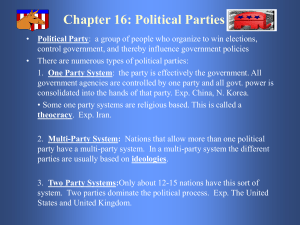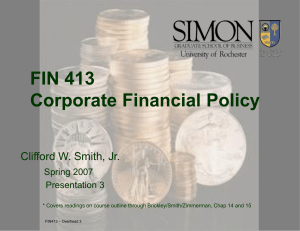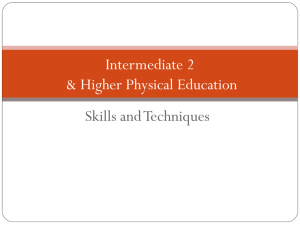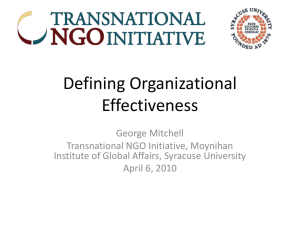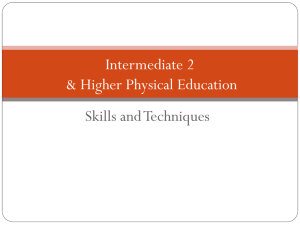Class 3
advertisement
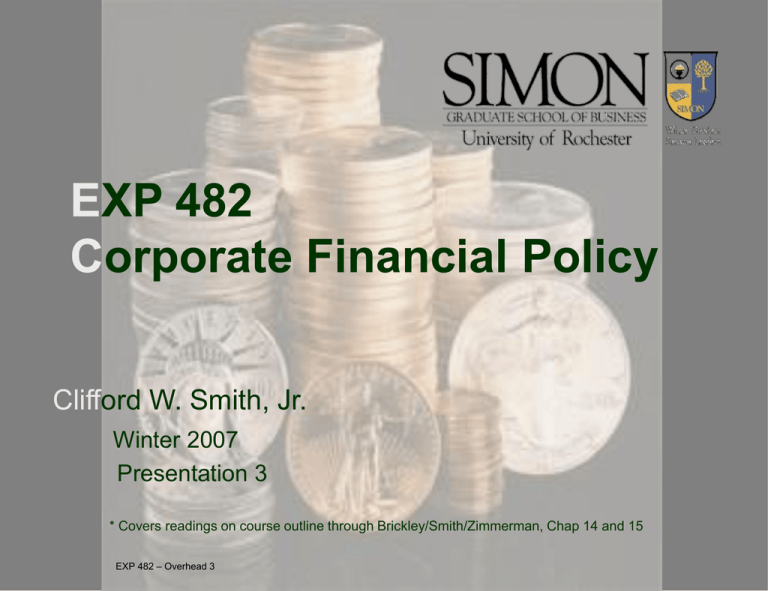
EXP 482 Corporate Financial Policy Clifford W. Smith, Jr. Winter 2007 Presentation 3 * Covers readings on course outline through Brickley/Smith/Zimmerman, Chap 14 and 15 EXP 482 – Overhead 3 Capital Structure Management Trade Off Hypothesis Pecking Order Hypothesis Market Timing Hypothesis EXP 482 – Overhead 3 Pecking Order Hypothesis There is an important information asymmetry between stockholders and managers “What you don’t know CAN hurt you”. If firm issues securities, those value depends on firm value investors price-protect themselves. This cost is largest for equity, then risky debt; internally generated capital is least expensive. EXP 482 – Overhead 3 Pecking Order If there is an “optimal” capital structure, the firm spends a lot of time away from it. Extreme Version: There is no optimal capital structure – observed capital structure is just the result of a sequence of myopic financing choices. EXP 482 – Overhead 3 Pecking Order Regression results are strong and robust. Look at tails of distribution. EXP 482 – Overhead 3 Market Timing Firm only issues equity when it’s overvalued There is no optimal capital structure EXP 482 – Overhead 3 Strategic Capital Structure Management Determine the optimal capital structure for the economic balance sheet. Look at the trajectory of capital structure. Whenever the costs of deviating from target exceed the cost of adjustment - adjust. EXP 482 – Overhead 3 Adjustment Costs Leverage Target Leverage Time EXP 482 – Overhead 3 Adjustment Costs Firm Value Target Leverage EXP 482 – Overhead 3 Leverage Adjustment Costs Differ by transaction ─ Costs of share issues are higher than that for debt ─ Costs of share issues are higher than that of share repurchases Exhibit fixed costs and scale economics ─ Equity offers are rare while bank loans are common ─ Optimal adjustment frequently involves overshooting ─ Most companies spend considerable time away from their target EXP 482 – Overhead 3 Strategic Capital Structure Management But investment opportunities are not smooth – they are lumpy and episodic. Suppose you have a large growth option – it will increase firm value by 50% and take three years to exercise. How do you finance this project? EXP 482 – Overhead 3 EXP 482 – Overhead 3 EXP 482 – Overhead 3 Strategic Capital Structure Management Pecking Order Hypothesis Market Timing Hypothesis Tradeoff Hypothesis EXP 482 – Overhead 3 EXP 482 – Overhead 3 Executive Compensation Benchmark Compensation Plan Suppose I offer a corporate manager a series of prespecified salary payments -- from the time he is hired until the time he retires -- with the only contingency that if the firm goes bankrupt, he will be fired, and his salary payments will be terminated. What are the conflicts of interest that will likely arise between owners and managers under this benchmark compensation plan? EXP 482 – Overhead 3 Conflicts of Interest between Owners and Managers Effort Problem Horizon Problem Differential Risk Exposure Problem Over Retention Problem (Payout Policy) Under Leverage Problem EXP 482 – Overhead 3 Potential "Solutions" to the Owner/Manager Conflicts EXP 482 – Overhead 3 Choice of Organizational Structure Potential "Solutions" to the Owner/Manager Conflicts Choice of Organizational Structure Board of Directors CEO CFO/COO Middle Management Production Workers EXP 482 – Overhead 3 Internal and External Labor Markets Potential "Solutions" to the Owner/Manager Conflicts The Market for Corporate Control Incentive based compensation contracts – explicit contracts – implicit contracts EXP 482 – Overhead 3 “Suffice it to say that one is the result of an extremely hostile takeover.” EXP 482 – Overhead 3 "Fixed" Compensation Salary Pension Insurance Perks EXP 482 – Overhead 3 Salary Typically largest component (but not always) Within contracting period salary is fixed (close to our benchmark case) Implicit contract to renegotiate salary in good faith based on performance No one in the firm determines his/her own salary (compensation committee of board comprised of outside boardmembers) EXP 482 – Overhead 3 Pension Plans Defined Benefits vs defined contribution plans Vested vs nonvested plans (ERISA) EXP 482 – Overhead 3 Tax Deferral Effect of Pensions Salary Pension Raise +100.00 Taxes -50.00 Interest +5.00 Taxes -2.50 Total 52.50 EXP 482 – Overhead 3 Contribution +100.00 Interest +10.00 Taxes -55.00 Total 55.00 Stock Option Plans Stock options granted to managers – Typically have approx. 5 years to expiration – European options (cannot be exercised early) – Restricted (cannot be sold before expiration) – The option is actually a warrant (when exercised, the number of shares outstanding increases), but dilution effect is small. EXP 482 – Overhead 3 Stock Option Plans Impact of option plan on: – effort problem – horizon problem – risk exposure problem – payout problem Stock Option S* X EXP 482 – Overhead 3 Other Stock-Based Compensation Plans Stock Appreciation Rights (SARs) Restricted Stock Phantom Stock Dividend Units Base manager's pay on "abnormal" stock return EXP 482 – Overhead 3 Accounting-Based Performance Plans Bonus (over 90% of medium to large size firms in US have some form of bonus plan) Pool of Available Funds Contributions to Pool Earnings EXP 482 – Overhead 3 Accounting-Based Performance Plans Bonus (over 90% of medium to large size firms in US have some form of bonus plan) Pool of Available Funds Contributions to Pool Earnings EXP 482 – Overhead 3 Accounting-Based Performance Plans Bonus (over 90% of medium to large size firms in US have some form of bonus plan) Pool of Available Funds Contributions to Pool Earnings EXP 482 – Overhead 3 Bonus Plans Impact of bonus plan on – effort problem – risk exposure problem – payout problem – horizon problem Long-term performance plans -- similar to bonus plans, but based on 3 to 7 year earnings performance Performance units EXP 482 – Overhead 3 Bonus Plans The use of accounting numbers vs stock prices for incentive compensation plans – – – Accounting numbers allow disaggregation of performance measures Accounting numbers can provide perverse incentives Accounting numbers subject to manipulation Top managers (who set accounting policy) typically compensated with stock-based plans. Lower level managers more likely to receive bonus. EXP 482 – Overhead 3 Potential "Solutions" to the Owner/Manager Conflicts Choice of Organizational Structure Board of Directors CEO CFO/COO Middle Management Production Workers EXP 482 – Overhead 3 Internal and External Labor Markets Bonus Plans What determines where a divisional manager's bonus payment falls along this spectrum? Divisional Performance EXP 482 – Overhead 3 Firm Performance Investment Opportunity Set Assets in Place Growth Opportunities Leverage High Low Compensation Level of Pay Low High Conditional on Performance Low High EXP 482 – Overhead 3 Level of Compensation Use of Stock Options Use of Bonus Plans Growth Options (Merck) Higher Higher Lower Credence Goods (Eastern) Higher Higher Higher Product Warranties (Yugo) Higher Higher Higher Future Product Support (Yugo/Wang) Higher Higher Higher --- --- --- Closely Held Firm Higher Higher Higher Size Higher Higher Higher Regulation Lower Lower Lower Tax Credits --- --- --- Marginal Corporate Tax Rate --- Lower Lower Marginal Personal Tax Rate --- Higher Higher Click here to type page Firm Characteristics Supplier Financing (Campeau) EXP 482 – Overhead 3 Investment Opportunity Set Cost of Debt Assets in Place Growth Opportunities Low High High Low High Low (Underinvestment) Benefits of Debt (Free Cash Flow) Predicted Leverage EXP 482 – Overhead 3
